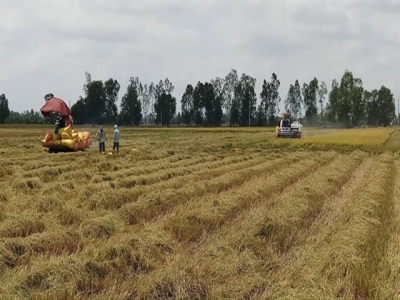Bạc Liêu expands cultivation of worlds best rice varieties

BẠC LIÊU — The Cửu Long (Mekong) Delta province of Bạc Liêu has decided to expand the cultivation of ST 24 and ST 25, two local rice varieties that rank among the world’s best, this year.
Harvesting the 2019 - 20 winter - spring rice in Bạc Liêu Province’s Phước Long District. The province plans to expand the cultivation of ST 24 and ST 25 rice varieties. — VNA/VNS Photo Huỳnh Sử
ST 24 ranked third in the World’s Best Rice Contest in 2017 and ST 25 topped the contest last year.
For the 2020 summer – autumn rice crop, the province has undertaken field demonstrations for growing the two varieties for the benefit of 60 households in five districts and Giá Rai Town on a combined area of 60ha.
After the crop is harvested, the area under the two varieties will be expanded to 3,500ha using the rice – shrimp rotation model this year, according to the province People’s Committee.
Under the rice - shrimp model, rice is grown in the rainy season and shrimp is bred in the dry season on the same rice field. Both are clean since farmers use few chemicals under the model.
The model will be adopted mostly in Hồng Dân and Phước Long districts and Giá Rai Town.
The province Department of Agriculture and Rural Development and local authorities will call on companies to tie up with farmers for growing the two rice varieties and buying the output.
Besides the province’s field demonstration models, farmers in many areas are also growing ST 24 rice for the summer – autumn crop.
In Phước Long District, for instance, they are growing 500ha, according to the local People’s Committee.
Trần Quang Liêm, deputy chairman of the People’s Committee, said the district would work with the province Agriculture Extension Centre to teach farmers techniques to improve production.
In the 2019 rice crop during the rainy season, farmers planted ST 24 on 45ha in Phước Long District and 120ha in Hồng Dân District.
Lưu Hoàng Ly, director of the department, said ST 24 and ST 25 have many advantages like being resistant to salinity and disease.
They provide average yields of 6.2 – 7.7 tonnes per hectare and offer farmers an income of VNĐ30.8 – 38.5 million (US$1,330 – 1,660) per hectare per crop since they are highly popular varieties, he added.
Related news
 Asia Coffee-Indonesia premium narrows on rising supplies; Vietnam domestic prices steady
Asia Coffee-Indonesia premium narrows on rising supplies; Vietnam domestic prices steady Vietnam’s domestic coffee prices held unchanged from a week earlier on Thursday capped by weak demand, while Indonesian premiums narrowed due to abundant suppli
 New opportunities open up for agricultural product processing
New opportunities open up for agricultural product processing Investment in processing technology is helping the agricultural sector recover after the pandemic, as well as opening a window of opportunity for Vietnam
 Vietnam's rice exports may slide after one-month high
Vietnam's rice exports may slide after one-month high Rice exports were the only bright part in the picture of Vietnam’s farm exports in the first six months of the year. However, the achievements